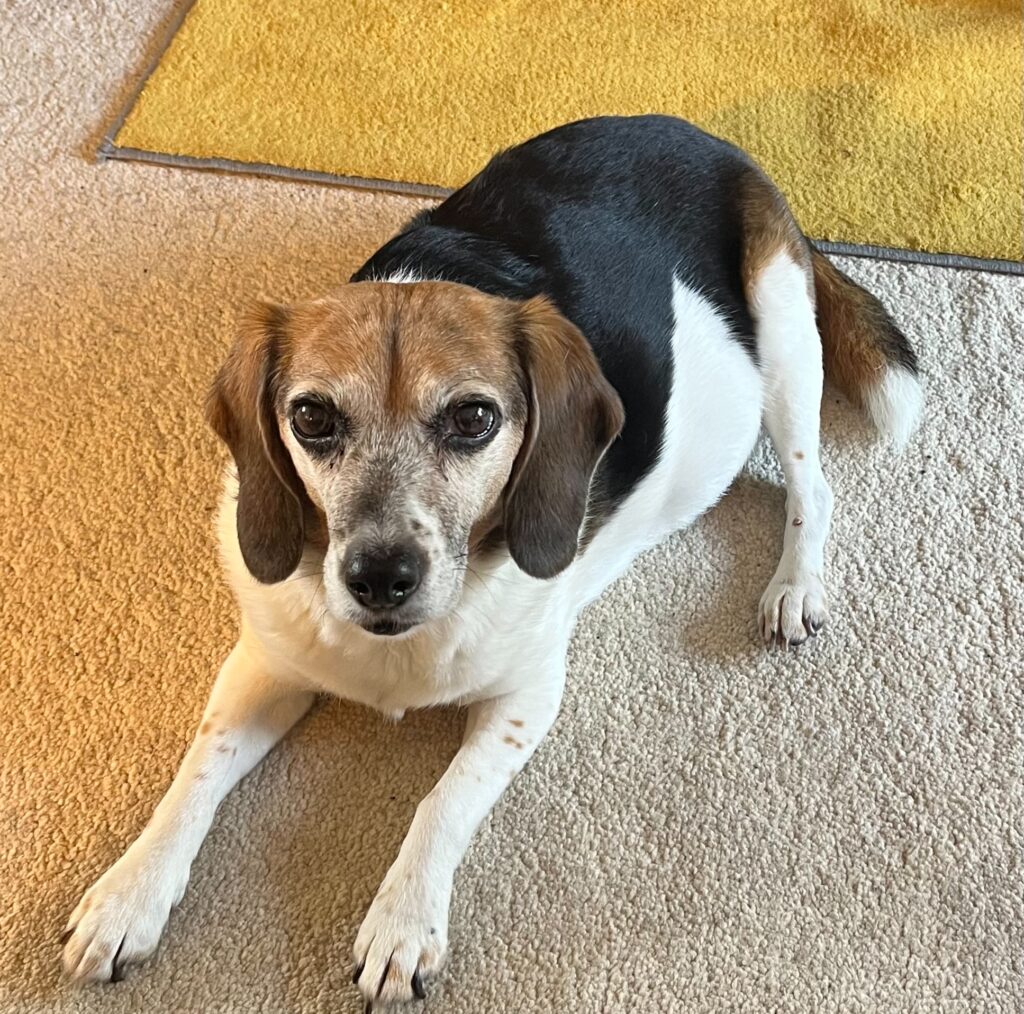Brave Pet of the Month-Lily!
Lily is a very brave 13-year-old Beagle and a familiar, very well loved face at Hollybank after she spent almost two weeks hospitalised with us earlier this year.
She initially presented to our out-of-hours providers completely unable to use either of her back legs after falling off the sofa at home. After their primary assessment and care, she was referred to see a neurologist for further investigations of her hind limb paralysis; a CT scan was performed which identified severe compression of her spinal cord by multiple slipped discs. The prognosis for this condition can be guarded. Surgery is possible, although, wasn’t thought appropriate in Lily’s case due to her age and other medical history, such as her heart disease. Medical management with strict rest and pain relief is an option, however, this requires both intensive nursing care in the hospital and a lot of time and dedication from the owners once at home. Understandably, this is not always feasible for some patients. Given this, euthanasia is a reasonable consideration for many cases, and this was discussed with Lily’s owners.
Lily’s owners decided to manage her condition medically, so she was transferred to Hollybank for hospitalisation and supportive care. Primarily this consisted of fluid therapy and ongoing pain relief to ensure she was as comfy as possible. Lily was restricted to cage rest to reduce the risk of further injury to her spine and repositioned regularly to avoid pressure sores developing. Our nurses also performed gentle physiotherapy on her back legs to prevent swelling and to reduce joint stiffness. Importantly, Lilly had a urinary catheter placed to empty her bladder for her; this is helpful to aid nursing care in all of our patients that are unable to walk, but particularly in Lily’s case as there was concern about whether she was able to urinate consciously following the damage to her spinal cord.
Within a couple of days, Lily’s comfort improved enough for us to start tapering down some of her pain relief medications. There were also subtle improvements to her hind limb strength, and she was able to stand for short periods when assisted. However, she still had a poor appetite and at this point she developed some diarrhoea. Recumbent patients with diarrhoea present an increased nursing challenge so a probiotic paste was started. Lilly’s owners also brought in some cooked rice for her (which is her favourite!) and she thankfully started to eat much better from then on.
About four days into her hospitalisation, Lily was making attempts to walk with the support of her sling, although she still had a long way to go as her feet kept knuckling with each step and Lily wasn’t able to correct their position to normal. Cheeky Lily then managed to remove her urinary catheter by herself; given the improvement seen to her hind limb strength, we opted not to replace the catheter and monitor to see whether Lily could consciously urinate – which she could!
One morning, about midway through her hospitalisation, Lily was quieter in herself and had a temperature. Lily was a high-risk patient for developing a urinary tract infection (UTI) given her inability to stand unassisted, her diarrhoea and the previous urinary catheter placement, so this was suspected as the underlying cause. Lily was given a 24-hour antibiotic injection while we waited for the results of her urine culture; this would confirm if she truly had a UTI and would also tell us which antibiotics would be best to treat it. A UTI was confirmed so the antibiotics were continued, and Lily quickly started to feel much better.
With Lily’s hind limb mobility and strength improving day by day, we began to start planning her discharge home. Even once discharged, Lily would have a long road to recovery and so it was important that her owners felt comfortable with crate resting, sling walking and massaging Lily’s legs themselves before collecting her. Multiple visits were organised for Lily’s owners with our nurses to provide an opportunity for them to practice the nursing care and physiotherapy required and they took to their new nursing roles really well!
After almost two weeks with us, Lily was making attempts to stand by herself, was starting to wag her tail again and was getting better at placing her feet when walking outside with the sling. Lily was ready to go home!
Six months on and after several weeks of crate rest and many many physio and hydrotherapy sessions later, Lily was continuing to make fantastic progress in her recovery. The hard work, patience and dedication from Lily’s owners over this time really has been so important to her recovery and it is so lovely to see her now, loving off lead exercise and playing with her Mabel and Stanley!

